Arab-American voters: A diverse, complex community disappointed with Biden and Harris
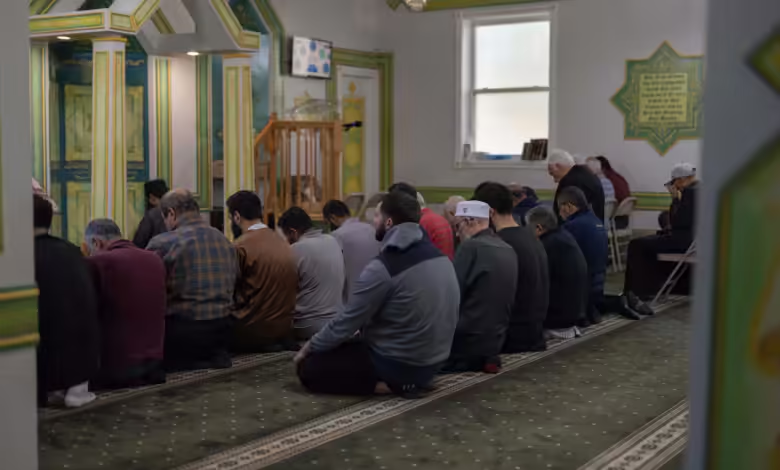



FAST DOWNLOAD
With a keffiyeh draped over her shoulders, attorney Sahar Faraj’s eyes flash with rage. Born and raised in Michigan, she identifies only as Palestinian and lashes out viscerally when asked about the November 5 elections. The interview takes place in Dearborn, the heart of the Arab community in the United States, on the eve of the first anniversary of the Gaza war. “The voice of the Arab community is a cry of pain, of people who only want to help their families there. So yes, it is true that elections are happening, but more importantly, a genocide is happening. We cannot talk about anything other than our relatives killed thanks to the military aid [to Israel] that we pay for with our taxes, and that is tremendously painful.”
Faraj — founder of the Return Collective movement for the return of Palestinian refugees — actively promotes the Boycott, Divestment and Sanctions (BDS) campaign against Israel in local shops — “we ask the owners to remove Zionist products from their shelves” — and refuses to say who she will vote for.
“I have citizenship, I was born here. But I am Palestinian. Maybe many of my fellow citizens will vote for [Donald] Trump, others for Kamala [Harris], like several of my friends, who are also convinced, and the rest will vote for no one, or for a third candidate, but what I will do on November 5 is continue to organize my community, with protests, demonstrations… It is more important to put an end to genocide than to vote,” she says.

For the first time in an election cycle, the Arab-American community — a group of about half a million in Michigan and between 3.5 and 4 million nationwide, according to unofficial sources — has not only has a vote, it has a voice. This community is far from a monolithic bloc; it includes Christians, Muslims, refugees recently arrived from Iraq and Yemen, and families who have been in the U.S. for generations, spanning diverse socioeconomic backgrounds. However, the wars in Gaza and Lebanon have thrust it into the national spotlight, highlighting the potential impact of its vote on the November election outcome.
In the Democratic primaries, the community expressed its dissatisfaction with Joe Biden’s support for Israel through a striking show of opposition: over 100,000 protest votes in the Uncommitted movement, a trend that later spread to other states. While this initiative is no longer a centralized movement — members are free to vote as they choose — even a fraction of that primary turnout could potentially upset Kamala Harris’ chances of victory in November.
Lebanese businesswoman, lawyer, and activist Soujoud Hamade showcases the timeless tradition of Arab hospitality at a beautifully designed café, one of many ventures emerging from a thriving community that continues to expand its success across the country. The surge of Yemeni cafés in New York, for instance, stands as a testament to this growing influence.
“Dearborn has historically been Democratic, but it seems as if the administration doesn’t recognize that this is a vital state, with some 200,000 registered [Arab] voters,” she says. “Or maybe they do know this, but are choosing to ignore it because they know they’ve lost our vote… That’s why you see Harris boasting about the support of Republican Dick Cheney, who was Bush’s vice president and helped lead a war. When did the Democrats become the party of war? Dearborn Democrats do not want that,” adds, arguing that the White House is “held hostage” by the pressure and influence of pro-Israeli lobbying groups.

Matthew Jaber Stiffler directs the Center for Arab Narratives at the Arab American National Museum in Dearborn. As a nonprofit, he apologizes for not being able to discuss the election, but he brings a level-headed voice to the debate.
“When we talk about the Arab-American community in Dearborn or the Detroit metropolitan area, which are similar, we are talking about a community that is more than a century old, and it is continually growing,” he explains. “It is very diverse by geographic origins [Lebanon, Palestine, Yemen, Syria, Iraq, Sudan, Egypt] and religious origins. There are families who arrived five generations ago and people who arrived last week. Because of the diversity, it is very difficult to sum up, but you could say that not all are Muslims, not all are immigrants, and all have arrived for different reasons.”
The earliest Arab arrivals to Dearborn trace back to the 1920s, though Jaber Stiffler points to 1890 — ”when Dearborn did not exist yet”— as the true beginning, when Lebanese immigrants were drawn by job opportunities in the pioneering motor industry, led by Ford. Many who followed came seeking refuge from war.
Today, the Palestinian cause stands as a unifying force for this diverse community, fueling their call for accountability from the Biden administration over its support for Israel. “Whenever there is war or bombing in their countries of origin, be it Yemen, Iraq or Lebanon, as now, they tend to unite and forget their political, regional or religious differences. This is seen in the case of Gaza: the current movement for Palestine, at the local and national level, is the most sustained in U.S. history.”
Sitting in the museum’s library — a nostalgic and informative journey through the vast Arab diaspora — Jaber Stiffler recalls the origin of the Uncommitted movement. “The Democratic primaries were the catalyst for a movement that dates back to Bernie Sanders’ campaign in 2016, when many Arabs began running for local, state and federal office,” he explains.
That change was empowering for the community. “They may not be a homogeneous block of voters, but they are very aware that there are enough of them to have an impact,” he explains.
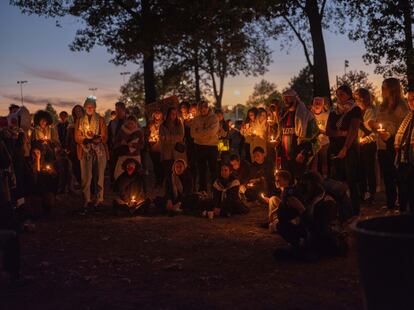
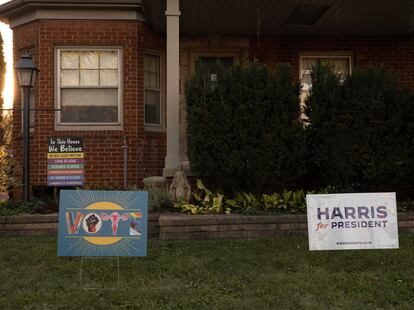
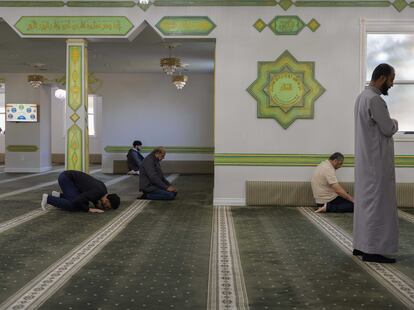
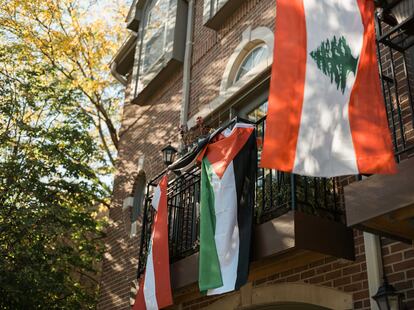
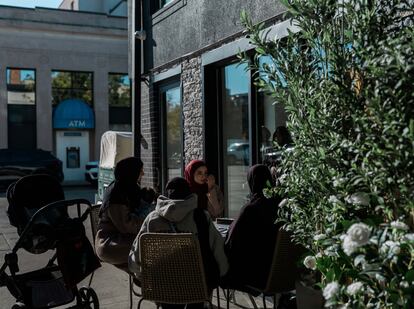
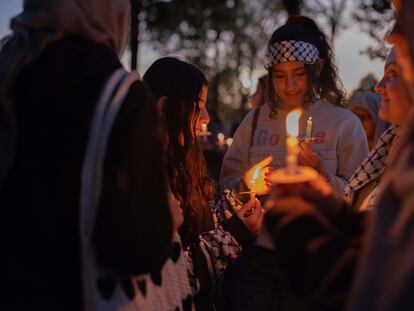
It’s impossible to predict a uniform voting pattern within such a large and diverse community, and that will be another unknown in November. Jaber Stiffler estimates Michigan’s Arab American population at around half a million, “and roughly four million nationwide, though census figures tend to be lower. Officially, they’ll say Michigan has about 300,000, and the entire U.S. between 2.5 and three million.” With 200,000 registered Arab American voters in Michigan, the possibilities are significant in a state decided by just 10,000 votes in 2016, when Trump narrowly defeated Hillary Clinton.
Voters are therefore weighing a range of choices: supporting Harris, albeit reluctantly, to stop Donald Trump — who many remember for his 2017 ban on citizens from several Muslim-majority countries — from being elected. But voting for Trump is an option for certain Christian groups, such as Iraqi Chaldeans or Egyptian Copts.
“I don’t agree with abortion or many gender-related issues; they’re too modern and revolutionary for me, and I think they could harm minors who haven’t formed an opinion on sex,” says Jamul, a Christian who emigrated from Egypt 15 years ago and now works as a parking supervisor in Detroit. “That’s why I’ll vote for Trump — plus, he has the business sense needed to manage the economy. Under his administration, there was no inflation.”
For many, the option of voting for a third party — such as the Greens, led by Jill Stein — is either a wasted vote or a potential boost for Trump. But for others, it is key to the drive for political change. “Many people will say that it is a wasted vote, but changes do not happen overnight,” says Hamade. “Our country needs political reform, voting for the lesser of two evils is no longer enough for us, because both parties are establishment and are subservient to pressure groups and corporate interests.”
Sitting on the terrace of another Yemeni café, veteran activist Hassan Jaber, a longtime supporter of the Uncommitted movement, reflects on the demographic intricacies of the community. “In reality, it is a peculiar group,” he says. “The second generation is highly educated, but economically, when compared to the broader American population, which can be classified as middle class, Arabs tend to occupy two extremes: either very high or very low incomes. Add to that their origin and the date of their arrival: the new refugees and immigrants are at the lowest level, and they react more intensely politically speaking. The settled ones have a more moderate stance.”

Over cups of fragrant cardamom tea and a tray of sweets, Soujoud Hamade — who is not only a businesswoman, lawyer, and activist but also a member of several local and state governing boards — never tires of asking for explanations from the party she still considers her own.
“When Democrats say that voting for Stein is a vote for Trump, they are starting from a perverse premise: believing that they have a right to our vote, when in reality they have to earn it,” she says. “They need to recognize that they have failed their voters, their voter base, instead of blaming them, and do better. Don’t blame us for wasting our vote.”
Whether it’s endless random comments from students wearing light-colored veils expressing the doubts they hear at home or a group of friends waiting for an Uber after a night out, all options seem possible.
“It was difficult for us to get a greeting from some neighbors, but we have two posters for the Harris-Walz campaign in the yard,” says Fatma Suheir, of Lebanese origin, as she watches her two children play in one of the few squares in Dearborn. “Voting for the racist Trump would be suicide, he has declared us his enemies, he wants to deport 20 million people… He is a supremacist!” adds Suheir. Of all the people who spoke to EL PAÍS, it is curiously the women — nearly a dozen — who express their willingness to vote for Harris.
“The Uncommitted movement was formed by the left of the Democratic Party,” says Jaber, “with the goal of having a voice in the party that they felt, or used to feel, was their own and to push for a progressive turn not only on Israel but on all other policies, especially social ones. But after the Democratic National Convention, when a Palestinian woman who only wanted to expose the suffering of her people and a doctor who wanted to tell what he saw in Gaza were denied the opportunity to speak, all bridges were broken.”

Hamade — who shares Jaber’s perspective on the potential for change represented by the Uncommitted movement — agrees that the Democratic campaign has failed to properly reach out to Arab-American voters. He recalls a recent visit from some of Harris’s emissaries: “They heard us, but they didn’t listen, as if they were wearing earmuffs.”
Friends in the administration have informed him that the decision not to engage with the Uncommitted is “Kamala’s own.” He adds: “That’s a slap in the face to the 100,000 voters who gave them a wake-up call in the primaries.”
Jaber confirms that their efforts to establish communication with the Democratic campaign have been futile. Perhaps that’s why Harris seems so uncomfortable, in rallies or televised debates, when the issue of the Gaza war comes up. She has stuck to Biden’s policy to the letter, calling for a ceasefire with one hand while supplying arms to Israel with the other. On one occasion, she visibly silenced an audience member who questioned her, and during a recent meeting with undecided voters in Pennsylvania, she veered off topic entirely.
Despite this, Harris has the backing of Emgage, the main lobby group for Muslims in the United States, which is spearheading the “One Million Muslim Votes” campaign for Democrats. Wa’el Alzayat, the group’s CEO, explains via email why they are supporting Harris. “It has been a very painful year for all of us, but our vote is a fundamental tool to guarantee a plural and equitable society. By voting, we also advocate for peace and justice for Palestinians and for the defense of our religious freedom. By voting, we promote significant changes on issues that reflect our values and aspirations,” he says.
However, he refrains from commenting on whether one of those values includes pursuing a ceasefire. The Democratic candidate for vice president, Tim Walz, has publicly acknowledged the group’s support, and the Democratic campaign is maintaining open lines of communication.

Regardless of who wins the election, the Uncommitted movement is not dead, Jaber cautions, but rather on hold. “The question is how to move from denouncing the wars in Gaza and Lebanon to establishing a more strategic and sustainable peace movement — one that is green, social, broader, and more inclusive. Right now there is a lot of disappointment and a sense of loss and we are not very clear about what the next step is, only that it will be forward, towards something more sustainable in time and space. A kind of counterweight to the shift to the center, and even to the right, that we saw in Chicago,” where the Democratic convention was held.
This moment may serve as a laboratory for a new approach to politics and the definitive recognition of Arab-Americans as a significant political force.






